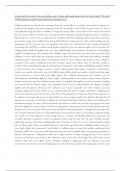At the end of the novel, the naval officer says “I know. Jolly good show. Like the Coral Island.” Why did
Golding choose to end the novel with such a mistaken view?
Golding ends the novel with this statement from the naval officer to reinforce the morals he imparts to
readers in the allegory; the ironic statement from the naval officer reflects how far gone society is. This is
exemplified through the officer’s inability to recognise society's flaws, even amid evil not only on the island
but across the world; he’s blind to the evil perpetuated by mankind, demonstrating how society is unable to
help ourselves as we don’t even recognise this as a problem. Therefore, Golding indicates how due to previous
generations' savage traits, children have learned this behaviour and repeated it, this is why Golding just has
young boys in the novel as they can epitomise how they have imitated the wider world; particularly
concerning the Cold War, in which world leaders competed to be the supreme power, just as the boys do.
Golding mocks adults throughout the text, “they walked along, two continents of experience and feelings,
unable to communicate”; this insinuates the childish nature of politicians at the time who instead of being
willing to co-exist and rectify the situation wanted to abuse their power and show their military strength.
Golding actually crushes any hopes of redemption when the idea of ‘grown-ups’ being a source of hope is
conveyed to be useless, Golding portrays how if adults created this violence they are therefore unable to
rectify it. This is developed through the development of ‘SamnEric’, who despite still holding ‘civilised’ beliefs
is forced to turn into a savage in order to survive, which depicts how society is stuck in a world where
violence is accepted as the norm, so even if belief systems differ, people are unable to break away from rigid
social structures in society and won’t fight against this; Golding demonstrates how humans are too
individualistic and selfish to fight for what is ‘right’. Golding alludes to how despite what we want to believe
humans are prone to our own self-destruction, which is exemplified through the events occurring as Golding
wrote this book; the British Empire was crumbling which is key to understanding this allegory, Golding
implies how humanity's obsession with authority and control especially over other humans not just
inanimate objects shows how similar we are to dictatorships like those of Stalin’s and Hitler’s. Golding does
this because he knows the only way his readership will understand how malicious humans have become, as
the violence occurring at the time was only justified as a way to ensure equality, by explicitly showing that all
humans are as corrupt as each other. Golding can also depict how blurred the lines between civilised society
and human savagery are now; as the boys brutally beat Simon to death, the one who was going to save them
and then display no remorse but try to alleviate their guilty consciousness; which clearly demonstrates the
abundance of evil to the point where even God, the all-powerful and merciful is so disgusted he abandons his
own creations and those who serve him. Ballantyne’s portrayal of the boys in Coral Island, angered Golding
very much as he had experience with teenage boys as a teacher and disliked Ballantyne’s distorted and
woefully optimistic perception of how socialisation occurs and his view that the boys wouldn’t become
malevolent creatures. Therefore, Golding ends with a reference to that text as a way of criticising the whole
plot, by allowing his readers to compare both texts, and realise especially when including world events at the
time which depict how inaccurate Coral Island is. Golding wants to ensure his readers understand how
humanity will be the cause of eternal destruction and that he has broken down the general perception of
humans. Alternatively, Golding does allow for a slight amount of hope, through his use of the cyclical
structure as the boys revert back to their previous states at the start of the play; they all become scared
children when the naval officer arrives. Perhaps, Golding is suggesting that our physical and social
environments may be the most determining factor in our behaviours, could he be implying that the boys only




